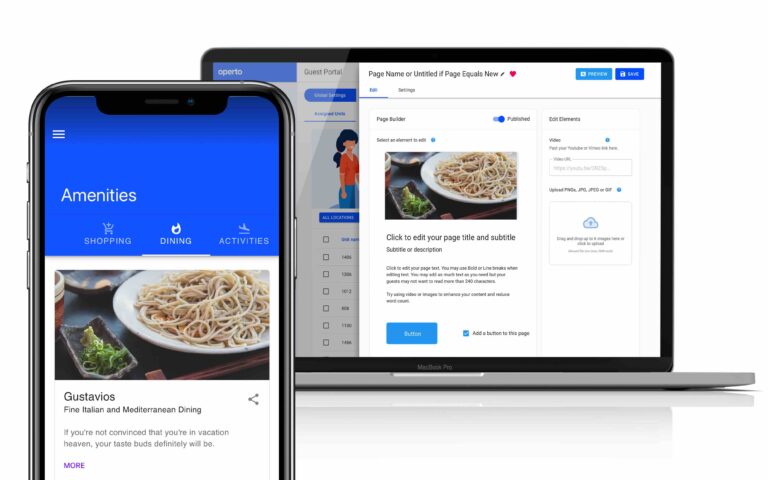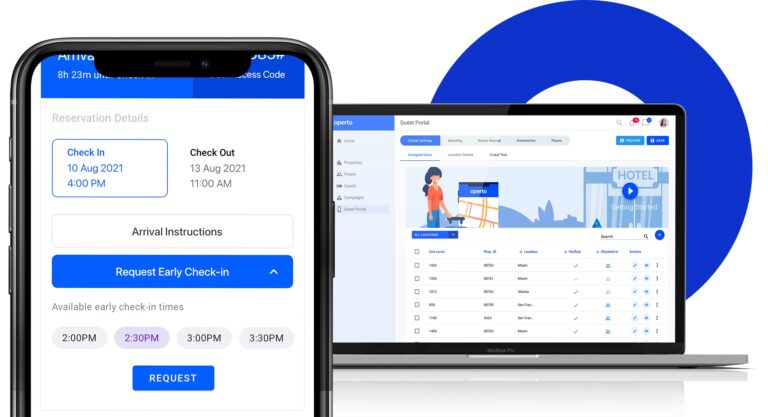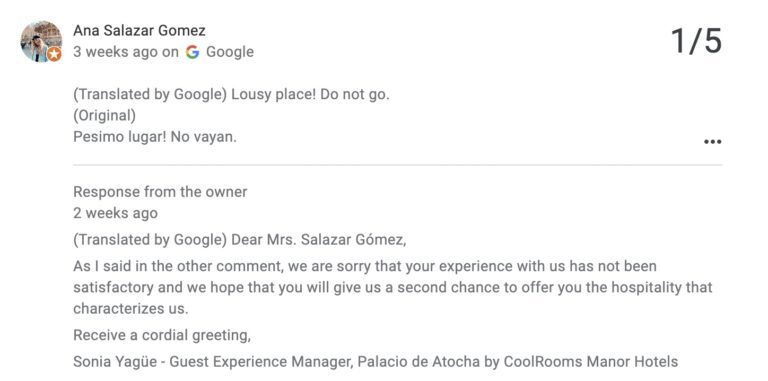7 Tips to Master Hotel Guest Communication for the Guest and Hotelier Experience
Hotels that grow and thrive pay attention to the fundamentals of the guest experience, but this doesn’t have to mean hiring more staff.
In fact, there are ways to enhance the guest experience and optimize your hotel operations without exceeding your budget. By following these hotel guest communication tips, you’ll be able to exceed guests’ expectations while also streamlining operations to reduce your workload and spending.
Delight your guests by engaging them in their stay before it begins
7 hotel guest communication tips that will improve your guest and hotelier experience
1. Use hotel guest communication software
Guest communication software is more than just a hotel industry trend. The right tool gives you the power to be more responsive to guests, in turn improving efficiency to enhance the hotel guest experience.
Let’s look at our own Operto Guest, which allows you to:
- Create customizable digital guidebooks that answer all your guests’ questions
- Provide your guests with helpful house manuals and local guides so they have all the information they need to enjoy their stay in once place
- Personalize upsells via easily customizable Smart Buttons
- Strengthen your brand with a white-label web app
- Offer digital check-in and check-out to reduce pressure on your front desk

Guest communication tools can save you hours of time managing guest inquiries in two ways.
Firstly, fielding questions from within your dashboard is far more efficient than taking calls and queries at the front desk.
Secondly, with a beautiful digital guide and house manual, you can provide guests with the information they need without needing to seek your help—exceptional for the guest and hotelier experience.
And with a customizable, white-label solution, you get to strengthen the hotel brand and create loyal customers.
2. Be communicative throughout the guest journey
The guest journey is not confined to the period of your guest’s stay. Rather, it starts the moment they find your hotel and consider booking, and continues until long after they check out. You need to be communicative throughout this time, which includes pre-stay, in-stay, and post-stay.
In-stay guest communication is mainly focused on ensuring comfort and satisfaction, but let’s take a look at how you can positively impact a guest’s journey before and after their stay:
Pre-stay
- Publish a detailed, helpful listing and website
- Be available to answer potential guests’ inquiries before they make their reservation
- Send a pre-stay message with relevant information a few days before check-in
Post-stay
- Send a thank you message and guest satisfaction survey after check-out
- Offer strategically timed discounts to encourage guests to book again
- Reward repeat guests with loyalty programs and referral bonuses
When you’re communicative at each stage of the guest journey, your customers feel supported, important, and valuable—which does wonders for guest loyalty and profitability. Now let’s take a closer look at the different phases of the customer journey.
3. Be proactive and speak to guests before they arrive
The pre-arrival communication stage is key to guest engagement as you establish a positive relationship with your guest and connect them with your brand.
Set your guests up for success by sending them a helpful pre-arrival email that gives them access to your guest app, where they kind find information on the area, the weather, and how to get to your hotel from the airport (this is also a great opportunity for upselling transport services).
During the pre-arrival phase, you should have members of your team available to answer any questions your guests may have when they head to your hotel—which is simple and streamlined with two-way, in-app messaging.


4. Check in with guests during their stay
Don’t wait until after your guests leave to find out what they did and didn’t like about your hotel. In-stay surveys are a great way to get guest feedback and correct any issues to enhance a guest’s stay while you still have the chance.
If your guest is just staying for a few days, send a quick questionnaire a few hours after check-in to make sure the arrival process went smoothly. And if your guest is staying for a week or more, a mid-stay review is best.
Any survey should be quick and convenient, and you can send them in the form of an SMS or Whatsapp message, or through your hotel guest communication software platform.
5. Make your guests feel special before they leave
Leaving a fantastic lasting impression is key when it comes to getting that positive review, so prioritize guest engagement at the very end of your customer’s stay. This means making the check-out process as easy as possible, as well as giving your guests a special treat to thank them for their stay.
This could look like a discount at your restaurant or spa to be used during their next stay, or even a little gift basket of locally produced treats. Whatever you choose to do, make your final impression a positive one so your guests leave your hotel feeling special and appreciated—this creates customer delight, which inspires glowing reviews, word-of-mouth referrals, and direct bookings.
6. Be fast and responsive
Simply put, guests don’t like waiting. Olga Heuser of DialogShift summed up what guest communication needs to be on The Hotel Marketing Show:
“Guests expect hotels to be available, and this is super important… Be approachable, be available, and be responsive… Be there for your guests, and remember they expect you to have a short response time.”
Timing is key with guest communication. Delayed pre-stay communication could mean a guest booking with a competitor, and sluggish in-stay communication can easily result in a negative review.
So, be sure all your staff are trained on communication standards, and consider using hotel guest experience software to make guest messaging fast and simple for the entire team.
7. Always stay on-brand
A number of different members of your hotel staff could be in contact with a guest throughout their guest journey. From your front desk staff to your room service attendants, all the team should maintain a coherent image.
Whether your hotel sets itself apart as being warm and friendly, professional and helpful, or luxurious and upscale, keep your brand image at the forefront of all guest communication.
This includes both digital and in-person interactions. Maintain your brand image on your website and social media accounts, and train staff members to uphold this identity throughout all their guest service interactions.
When you have a strong, recognizable brand—and a consistent brand voice is essential to this—your guests are more likely to respond positively, which means increased guest loyalty and more direct bookings.
3 don’ts of guest communication
Work on what you need to do to optimize your hotel guest communication, but also keep in mind a few things to avoid. Here are three don’ts of guest communication for hoteliers:
- Don’t over-communicate:
Guests want helpful information, but they don’t want to be pestered. So give them time to themselves to relax and take control of their own vacation experience. Don’t overdo it with your guest communication, and space out messages so guests don’t feel overwhelmed.
- Don’t oversell:
When you oversell, you set yourself up for failure, as guests will arrive at your hotel with expectations you’re unable to meet. So, be honest and up-front with guests about what you can and can’t deliver.
- Don’t react negatively to negative reviews:
Never be defensive when responding to a negative review. When those one or two-star reviews pop up, be positive and helpful to remind guests they’re always your number one priority.


Up your hotel guest communication game for happier visitors and more business
By taking the extra steps to always be helpful, responsive, and on-brand, you can create a frictionless, memorable experience for your guests. You can help achieve this by implementing powerful tech solutions like hotel guest communication software.
The right solution gives you the tools you need to optimize communication and enhance the guest experience—tools like a white-label guest portal, customizable digital guidebooks, and in-app upsells.
If you leverage tech to improve and streamline your communications, you’ll reduce your workload and keep guests returning.
FAQs about hotel guest communication
Why is guest communication important for hotels?
Guest communication is so important for hotels because it’s what can make or break a guest’s experience. When they stay at a hotel, guests expect a full-service experience, and guest communication is an essential part of that. Good guest communication gives guests access to key information, insights, and resources for a better stay.
How do hotels communicate with guests?
Hotels can communicate with guests in a multitude of ways. In-person communication is traditionally one of the key methods, but digital means of communication are becoming increasingly important. This includes through your website and listings, through messaging apps and text messaging, and within hospitality apps like a guest messaging software tool.
What are the benefits of guest messaging software?
Guest messaging software has a variety of benefits, as it helps you stay in better contact with guests while saving you time and money. Good guest messaging tools allow hoteliers to hire less staff to address guest inquiries, as questions can be answered more efficiently. A guest messaging solution like Operto means spending less time on communication while enhancing the guest experience.
More Articles
Want an operations tool that’s smooth and flexible?
![5 Steps to Scale Your Vacation Rental Business [2024]](https://operto.com/wp-content/uploads/2022/11/shutterstock_1575539170-scaled.jpg)


